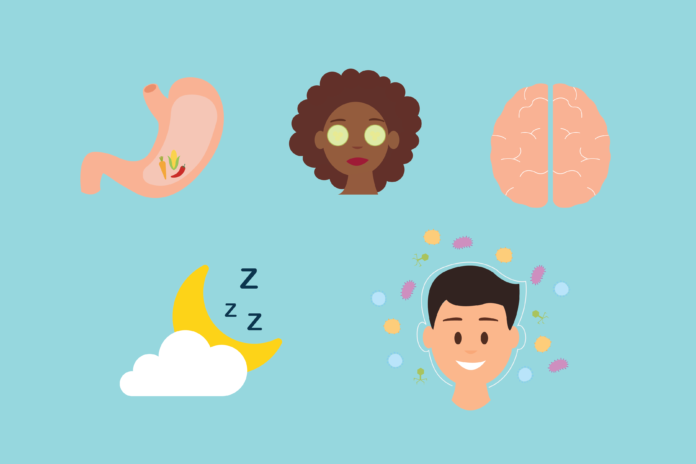Doctors and professors explore the intricacies of gut health and its connection to mental health and overall well-being
This article is the second installation of The California Aggie’s Mind and Body series, which discusses nutrition, physical well-being and mental health.
Recently, the issue of gut health has gained an online presence as more people have created videos on platforms such as TikTok discussing their gastrointestinal issues and ways to create a healthy internal environment.
One famous claim states that 90% of all our serotonin is produced in our gut, and that maintaining our gut’s biome corresponds to greater well-being. Dr. Michelle Dossett, an assistant professor at UC Davis’ department of internal medicine, affirmed the truth of this claim and stated that our gut is responsible for a large portion of our serotonin and melatonin production.
“That is something that we are still trying to understand, but there very clearly is a link with gut health and mental health,” Dossett said. “Studies have suggested that the gut microbiome, the bacteria that you have in your gut or that you don’t have in your gut are linked with depression or other mental health issues.”
Dr. Asha Gupta Cogdill, an assistant professor and gastroenterologist specialist at UC Davis, stated that there is a strong connection between gut and mental health.
“These two systems are closely linked by the ‘gut-brain axis’,” Cogdill said. “Gut health affects anxiety and mental illnesses and vice versa.”
Though studies have acknowledged this link, Dossett emphasized that there is no definitive evidence that proves specific foods can boost serotonin. Instead, both Dossett and Cogdill promote eating a healthy diet in order to maintain a healthy gut.
Specifically, Dossett mentioned the importance of integrating probiotics into one’s diet as well as prebiotics, which is what probiotics eat. She also recommends a Mediterranean diet with plant-based foods that contain soluble and insoluble fibers to mediate and maintain one’s gut.
Similarly, Cogdill also recommends eating a diet high in vegetables, fruits and whole grains while also adding probiotics.
“Consuming probiotic foods such as Greek yogurt, kefir and kombucha can help some people who have had disturbances in their gut microbiome,” Cogdill said.
Angela Zivkovic, an assistant professor in UC Davis’ department of nutrition, also asserted the necessity of a well balanced diet. Zivkovic believes in the importance of integrating essential nutrients, vitamins and minerals into one’s diet, but also stated that these ingredients can come from more basic options than trendy superfoods.
“There’s no reason to spend more money on ‘fancy’ superfoods when you can get so much from simple and inexpensive standbys like carrots, spinach [or] broccoli,” Zivkovic said.
Dossett also stated that incorporating elements of fad diets can be a way for people to feel like they are eating healthier, citing the superfood movement as an example.
“People sort of think that if I eat the goji berries, then I can have the Red Bull or double chocolate ice cream,” Dossett said. “It’s a way of giving oneself license to maybe not eat the healthiest foods sometimes.”
Zivkovic also stated that eating a healthy diet to maintain gut health is futile without drinking water.
“One of the most critical things to do is hydrate,” Zivkovic said. “No superfood can stand up to the benefits of drinking enough fluids and being well hydrated.”
Beyond mental health implications, poor gut health caused by stress correlates to common gastrointestinal issues (GI), according to Cogdill.
“Stress and anxiety play a major role in many GI conditions, particularly chronic nausea, functional dyspepsia and irritable bowel syndrome,” Cogdill said. “The first step is to recognize this connection to prevent worsening your anxiety by worrying about your GI health.”
Furthermore, Dossett stated that a lack of sleep may also cause poor gut health and make it more likely for someone to succumb to stress.
In addition to eating a healthy diet, pivoting one’s lifestyle is also necessary for more sustainable outcomes, Dossett said. She recommends mind and body activities that include meditation and breathing exercises. For college students, she recommends new study habits that divert the need to procrastinate and pull regular all-nighters. To curb stress, anxiety and possible nausea, Cogdill mentioned the process of medical therapy, under the direction of a physician.
As the gut is responsible for important cognitive actions and productions, its maintenance is essential to curb pains and improve energy levels and mood, according to Zivkovic.
“Well if you think about the fact that we have roughly seven feet of intestinal tract, and that as much as 80% of the cells of our immune system reside there, we can start to appreciate how important a healthy gut is for our overall health,” Zivkovic said.
Written by: Farrah Ballou — features@theaggie.org



